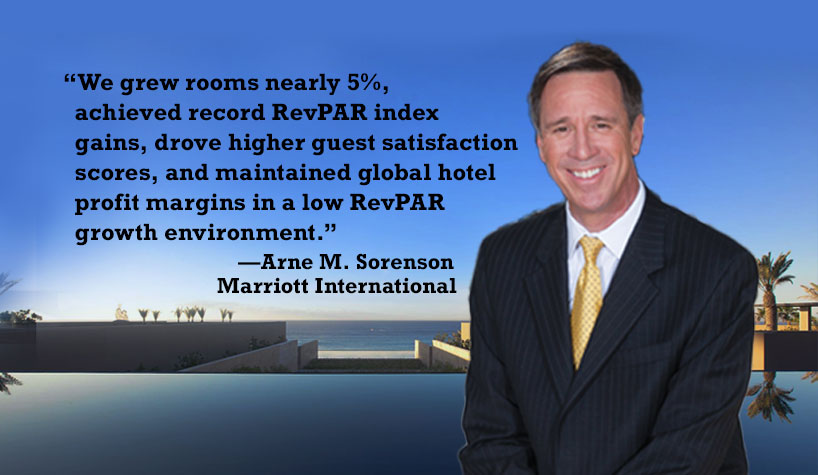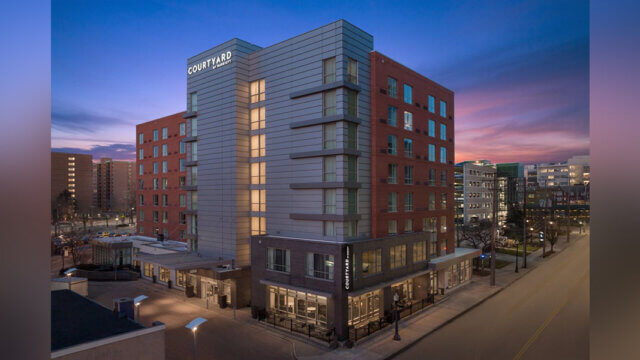BETHESDA, MD—Marriott International Inc. has posted its fourth quarter 2019 results. The company reported a RevPAR increase as well as pipeline growth, but cannot yet predict the coronavirus impact.
Arne M. Sorenson, president/CEO of Marriott International, said, “We are pleased with our performance in 2019. We grew rooms nearly 5%, achieved record RevPAR index gains, drove higher guest satisfaction scores, and maintained global hotel profit margins in a low RevPAR growth environment. Our fee-driven, asset-light business model and successful asset recycling continued to generate significant excess cash, allowing us to return a total of $2.9 billion to shareholders during the year.
Fourth quarter reported net income totaled $279 million, a 12% decrease from prior year results. Fourth quarter adjusted net income totaled $517 million, a 4% increase from prior year adjusted results.
Fourth quarter 2019 comparable systemwide constant dollar RevPAR rose 1.1% worldwide, with 1.5% growth outside North America and 0.9% growth in North America.
Worldwide comparable systemwide RevPAR index grew 240 basis points in the fourth quarter.
Full year 2019 comparable systemwide constant dollar RevPAR rose 1.3% worldwide, with 2.2% growth outside North America and 1.0% growth in North America.
Development
The company added more than 78,000 rooms globally during 2019, including roughly 14,300 rooms converted from competitor brands and approximately 34,000 rooms in international markets. At year-end 2019, Marriott’s worldwide development pipeline totaled nearly 3,050 hotels and approximately 515,000 rooms, including roughly 23,000 rooms approved, but not yet subject to signed contracts. Over 220,000 rooms in the pipeline were under construction at the end of 2019.
Other Highlights
Adjusted EBITDA totaled $901 million in the 2019 fourth quarter, a 4% increase compared to fourth quarter 2018 adjusted EBITDA.
Fourth quarter reported diluted EPS totaled $0.85, compared to $0.92 in the year-ago quarter. Fourth quarter adjusted diluted EPS totaled $1.57, compared to fourth quarter 2018 adjusted diluted EPS of $1.44. Reported and adjusted diluted EPS for the 2019 fourth quarter included the benefit of $0.32 of asset sale gains, partially offset by $0.26 of asset impairments. Reported and adjusted diluted EPS for the 2018 fourth quarter included the benefit of $0.02 of asset sale gains.
Full year 2019 reported diluted EPS totaled $3.80, compared to $5.38 in the prior year. Full year 2019 adjusted diluted EPS totaled $6.00, compared to $6.21 in the prior year. Reported and adjusted diluted EPS for 2019 included the benefit of $0.33 of asset sale gains partially offset by $0.25 of asset impairments. Reported and adjusted diluted EPS for 2018 included the benefit of $0.66 and $0.65 of asset sale gains, respectively.
For full year 2019, Marriott repurchased 17.3 million shares of the company’s common stock for $2.3 billion, including 3.1 million shares for $432 million in the fourth quarter.
“Marriott Bonvoy is driving market share at our hotels by leveraging our industry-leading distribution and powerful brand portfolio. Loyalty members accounted for 52% of occupied rooms in 2019, a 250-basis point increase year over year. Our worldwide systemwide RevPAR index for comparable hotels increased 200 basis points in 2019 and rose 240 basis points in the fourth quarter alone. We are increasing our market share of rooms as well, with record signings in 2019 taking our development pipeline to approximately 515,000 rooms at year-end,” he said.
Coronavirus
Due to the uncertainty regarding the duration and extent of the coronavirus outbreak, Marriott cannot fully estimate the financial impact from the virus, which could be material to first quarter and full year 2020 results. As such, the company is providing a base case outlook for the first quarter and full year 2020, which does not reflect any impact from the outbreak.
“Our thoughts are with everyone impacted by the coronavirus situation. I am particularly proud of our Asia-Pacific team as they assist affected customers and fellow associates. To date, the crisis has primarily affected our Asia-Pacific region,” Sorenson said.
Assuming the current low occupancy rates in the Asia-Pacific region continue, with no meaningful impact outside the region, Marriott estimates the company could earn roughly $25 million in lower fee revenue per month, compared to its 2020 base case outlook. Room additions for the current year could also be delayed as a result of the coronavirus outbreak.
He continued, “Given the fluid nature of the situation, we have not reflected the impact from the outbreak in our base case outlook for this year. For full year 2020, our base case outlook assumes comparable systemwide RevPAR on a constant dollar basis will be flat to up 2%, with RevPAR growth in North America around the middle of that range. We assume net rooms additions of 5 to 5.25% in 2020.
“Given those assumptions, our base case assumes gross fee revenues in 2020 could total $4 billion, a 5% increase compared to 2019,” he continued. “However, assuming the current low occupancy rates in the Asia-Pacific region continue, with no meaningful impact outside the region, we estimate the company could earn roughly $25 million in lower fee revenue per month, compared to our 2020 base case outlook.”

